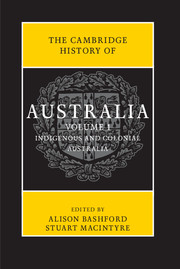Book contents
- Frontmatter
- Contents
- Abbreviations
- List of maps
- List of figures
- List of tables
- Notes on contributors
- Map
- Preface
- Introduction
- PART I
- PART II
- Further reading
- Chronology
- Index
- Frontmatter
- Contents
- Abbreviations
- List of maps
- List of figures
- List of tables
- Notes on contributors
- Map
- Preface
- Introduction
- PART I
- 1 Nation building, 1901–14
- 2 The Great War and its aftermath, 1914–22
- 3 Search for a solution, 1923–39
- 4 World War 2 and post-war reconstruction, 1939–49
- 5 The Menzies era, 1950–66
- 6 Instability, 1966–82
- 7 Growth resumed, 1983–2000
- 8 The new millennium
- PART II
- Further reading
- Chronology
- Index
6 - Instability, 1966–82
from PART I
Published online by Cambridge University Press: 05 November 2013
- Frontmatter
- Contents
- Abbreviations
- List of maps
- List of figures
- List of tables
- Notes on contributors
- Map
- Preface
- Introduction
- PART I
- PART II
- Further reading
- Chronology
- Index
- Frontmatter
- Contents
- Abbreviations
- List of maps
- List of figures
- List of tables
- Notes on contributors
- Map
- Preface
- Introduction
- PART I
- 1 Nation building, 1901–14
- 2 The Great War and its aftermath, 1914–22
- 3 Search for a solution, 1923–39
- 4 World War 2 and post-war reconstruction, 1939–49
- 5 The Menzies era, 1950–66
- 6 Instability, 1966–82
- 7 Growth resumed, 1983–2000
- 8 The new millennium
- PART II
- Further reading
- Chronology
- Index
Summary
Australia entered the post-Menzies age in a reassuringly languid fashion in the summer holiday of early 1966. Menzies had stayed so long and exercised such effortless supremacy over the nation's politics right to the end that no-one seriously doubted he was retiring on his own terms or begrudged his explanation that he had simply run out of steam. Harold Holt's instalment as Liberal Party leader and prime minister was similarly bloodless. After being elected unopposed, Holt recorded with satisfaction that he had reached the office without ‘stepping over anyone's body’.
The tranquillity of the leadership transition belied the upheavals ahead. At his farewell press conference Menzies observed majestically that it could not be said he was ‘leaving a sinking ship’ – the nation was prosperous and strong. Yet his inheritance was not so uncomplicated. Change, not stability, was becoming the leitmotif of the times. A survey of the national mood in 1966 described Australia as ‘a society in transition…the old patterns of living and thinking and acting have broken up and the new ones are still evolving’. Whereas the incipient nature of this transition during the final stages of his prime ministership had allowed Menzies to avert his eyes imperiously, his successors were not permitted that luxury as the social trends ripened and the calls for change grew insistent in the decade's second half. Ironically, it was the material security that Menzies proudly extolled that was fundamental to the transformed expectations and attitudes of the generation coming of age at this time. In the year he retired 40 per cent of the population was under 21 years old. Menzies' insouciant assessment of his legacy failed also to take into account the ticking time bomb of intervention in the Vietnam War. Opposition to the war and conscription would soon become the defining issue of the age, unsettling the political landscape and stimulating other movements of social dissent. Never quite sure whether they should try to flow with or tame this restless tide, Menzies' heirs were swept aside.
- Type
- Chapter
- Information
- The Cambridge History of Australia , pp. 135 - 161Publisher: Cambridge University PressPrint publication year: 2013



